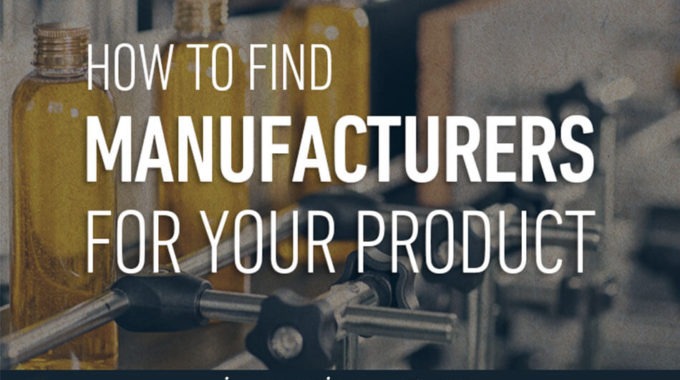China is the manufacturing capital of the world for one reason: they can manufacture just about any product they can imagine, and can generally be cheaper than any other country. If you buy and import from China and/or sell own brand products online, or if you have the retail capability, these products are likely to be manufactured in China.
And you’re not alone. By 2015, China has exported goods worth almost $ 500 billion to the United States! Research then becomes how to find a manufacturer in China. As companies continue to seek ways to cut production costs and increase profit margins, they outsource their manufacturing and manufacturing activities further in China.
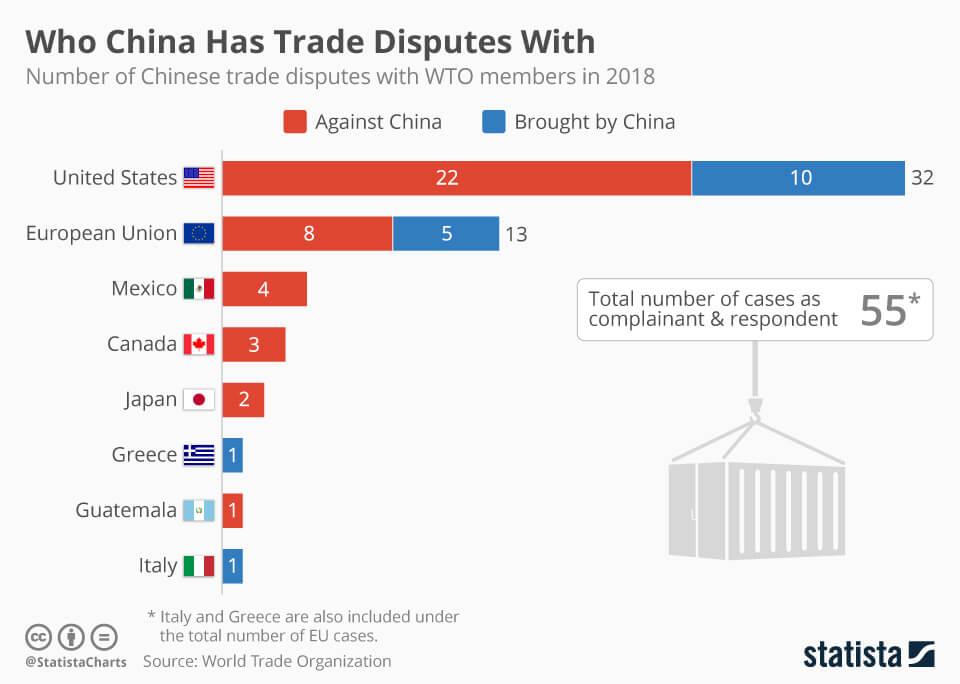
Successful companies devote a lot of time and effort to researching and verifying suppliers to ensure that their quality standards are met. While this sounds like a standard usage procedure, it is a much harder task than most people realize. It is not uncommon to find hundreds of factories capable of manufacturing your product, and everyone will do almost anything to try to conquer their business. This is where the challenge is.
Find a quality manufacturer in China that not only meets your production needs but also that your quality requirements can be an almost exasperating task. In fact, a quick Internet search will reveal hundreds of nightmare stories about Chinese suppliers: transit operations, scams, incorrect product shipments, bad quality, hostage requests, etc. That is why it is absolutely essential to do due diligence when looking for a provider.
10 Tips Help To Choose Quality Manufacturers in China
- Online Directories: While websites like Alibaba, Made-In-China, DHgate, and Global Market offer convenient lists of thousands of suppliers, they rarely provide a guarantee of their legitimacy. In fact, in many of these directories, suppliers can acquire a “star” rating or similar logo or attribution status that is believed to inspire potential buyers. So, instead of earning a good reputation, they can simply buy that status. Globally, Global Sources tend to have better manufacturers because they carry out a verification process and impose stricter standards on accepted suppliers.
- Request samples as you wish: When you find quality manufacturers in China that meet your initial needs, request multiple samples. There are many very similar horror stories, all related to the fact that the samples that the factory sent to customers were not the same as the final product. By ordering only 1 or 2 samples, the supplier can create a perfect and high-quality version of your product and send it as a sample of the final product. As dark as it seems, it happens. You can minimize the risk of this happening if you order from 10 to 50 samples (depending on the cost/size of the product, etc.). Explain that you need samples for all your representatives or stores and be sure to negotiate the cost of these samples when ordering the product. Factories usually do this if it means you will be placing a real order. To retrieve cost samples, you can list them on eBay, Amazon FBM, or other platforms, which will also provide information and validation if it is a new product.
- Background Check: If you find a potential Chinese manufacturer online, it is advisable to conduct at least a basic background check. You can get online corporate credit reports, licenses, bank information and other relevant data from various public sources. But unless you know where to find this information and read Mandarin, it is usually best to buy a report containing this information from one of the companies specializing in this field, such as the China Exam. This will give you a good overview of the provider and will allow you to make an informed decision on whether or not to continue a business relationship with him.
- Discuss subcontracting with the vendor: Many vendors outsource to increase profits. If you manufacture the complete product elsewhere or outsource some parts or raw materials, you are taking more risks in terms of quality. Be sure to discuss this issue with potential suppliers and determine if they will outsource part of your product to another factory. Whatever the answer, it would be prudent to add a subcontracting clause to your contract to cover any issues that may arise from this practice.
- It is not enough to choose by price: the attractiveness of outsourcing production in China is the much lower cost of labor. But do not make the big mistake of trying to choose a supplier solely on the basis of price. As we detail in our previous article on Chinese suppliers, a factory offering the lowest price or a low price guarantee is a recipe for disaster. The old saying “you get what you pay for” is truer in China than in almost any other place. You can be absolutely sure that if a factory offers you the lowest price (significantly), you will recover those costs for an additional fee or, more likely, or worse, you will use cheap materials and your product. The quality will suffer.
- Ask if they have customers in the USA: In general, if a factory exports to the U.S. with substantial capacity, it generally means that it is capable of producing quality products. On the other hand, if most of a supplier’s customers are based in the Middle East, it is generally reasonable to assume that their quality is far from ideal. In general, products sold in the Middle East are of inferior quality to most Western countries. We can say this with confidence, thanks to our years of experience in outsourcing and researching quality manufacturers in China, and unfortunately, in many of the terrible suppliers, we have added to our blacklist that we have maintained for almost 10 years.
- Become an expert on your product: you must be an expert on your product. If a provider suspects that he is just “climbing,” he is much more likely to benefit. It is your responsibility to know all relevant specifications and details about your product: material composition, technical specifications, tolerances, required certifications, manufacturing process, etc. Therefore, we ask all our customers to complete a technical file (which we supply) before looking for a supplier. (You will find an example of a very complete datasheet in our article here). Research and ask questions about your product before you communicate with suppliers so you can check them more efficiently and determine which ones are not only competent but also capable.
- Avoid Long Emails: When you send an email to a potential provider, remember that English is not your first language. In fact, many of the factories we work with do not have English-speaking staff. So you may assume that at least some of them will use translation software to convert your email into Mandarin. Therefore, it is essential to maintain brief and relevant communications. We suggest using bullets or a numbered list because you’ll find that providers often respond more often to emails that are formatted as such. Because? It is simply easier to digest short sentences and answer each chip/number individually.
- Sourcing Fairs: One of the best ways to find quality manufacturers in China is to attend any of the industry fairs in mainland China and Hong Kong. The good news is that there are many supply programs available. The bad news is that you will have to spend time and money to go to China to attend these fairs personally. One should also keep in mind that traveling to China requires a little more work than just getting a passport. All this takes time, so check the requirements and plan at least 3 months in advance. While traveling to China is a tedious task, there is no better way to evaluate potential manufacturing partners than to meet them in person. Of course, a reliable China Sourcing Agent will help you solve all of the questions.
- Visit the factory: Whenever possible, you should go in person to the factory or send a representative to do so. You will be amazed at how much the suppliers will make a great legitimate plant believe. We have seen many examples of obscure suppliers using fake photos to give the impression that they are manufacturing facilities. It is even considered acceptable practice for small suppliers and business companies to hold meetings and visit the impressive facilities of other manufacturers and claim those rights as theirs! In general, they will provide signage to hide the name and logo of the plant, so that it looks like it’s your own facility. So if you decide to visit the factory, do your homework and make sure your registered address matches the one provided for your visit.
Where to Find A Good Manufacturer in China?
1. Alibaba.com: was launched in 1999, is the leading wholesale sales platform in the world. And it serves millions of buyers and suppliers worldwide. As a member of the Alibaba Group, our mission is to facilitate business on the go. We do this by giving suppliers Providing products to customers around the world, and the tools that shoppers need to find products and suppliers quickly and efficiently.
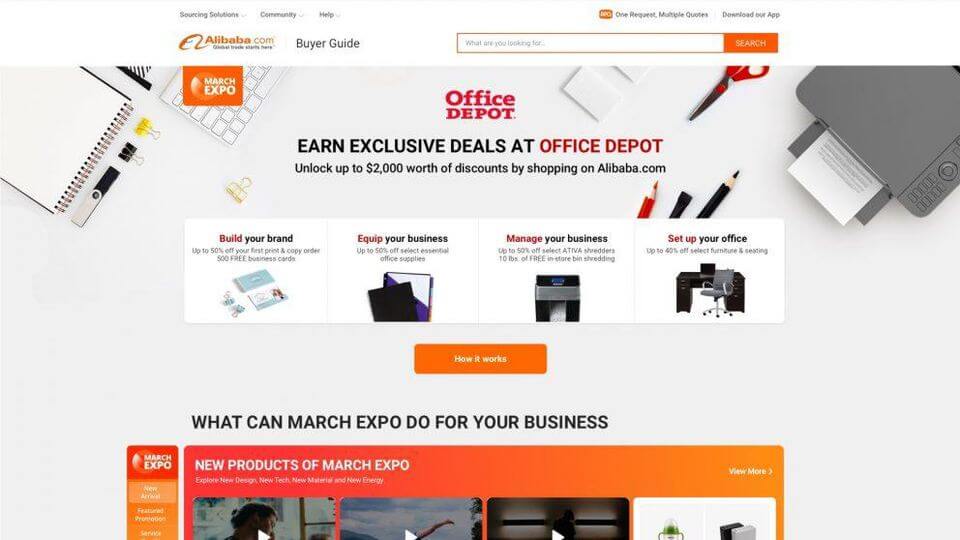
2. DHgate.com: DHgate.com is the world’s leading online wholesale platform for products made in China. It connects international buyers to Chinese wholesalers who offer products of the same quality as those offered elsewhere for a fraction of the price. DHgate is home to more than 30 million products in a wide range of categories including clothing and accessories, computers and networks, consumer electronics, toys and recreation, health and beauty, handbags and jewelry, home, cars, and more. DHgate offers a buyer protection plan, a secure refund policy, express delivery, and shipping tracking. It is committed to providing a quick, easy and secure shopping experience for businesses and consumers worldwide.
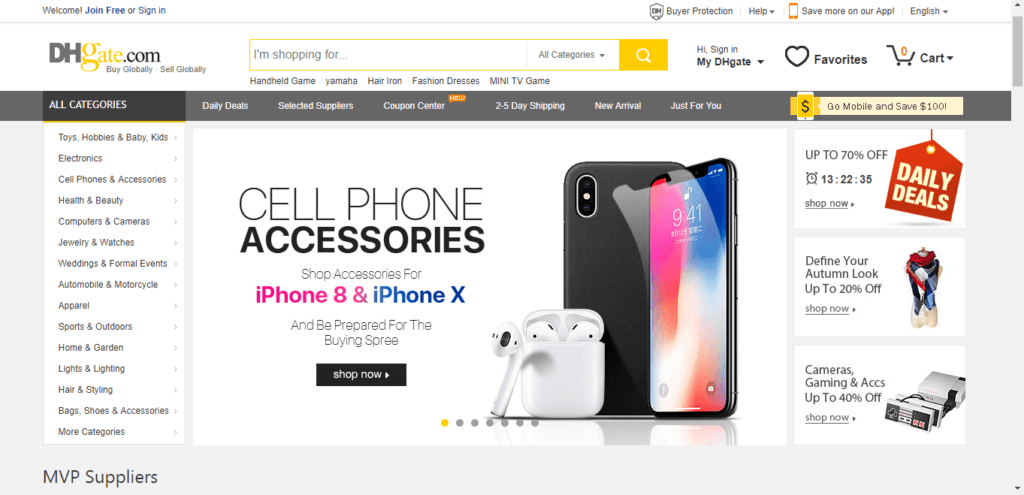
3. Made-in-China.com: was founded in 1998 and is a leading B2B e-commerce platform in China, developed and operated by Focus Technology Co., Ltd. It is dedicated to serving the world trade sector and the Chinese high quality. products. quality and supplier information for global buyers. Today, Made-in-China.com is a leading B2B portal worldwide, specializing in bridging the gap between global buyers and quality Chinese suppliers. The first enterprise-to-business e-commerce platform in China, which conducts a comprehensive review of released vendors. Provide product information for 27 categories and 3,600 subcategories.
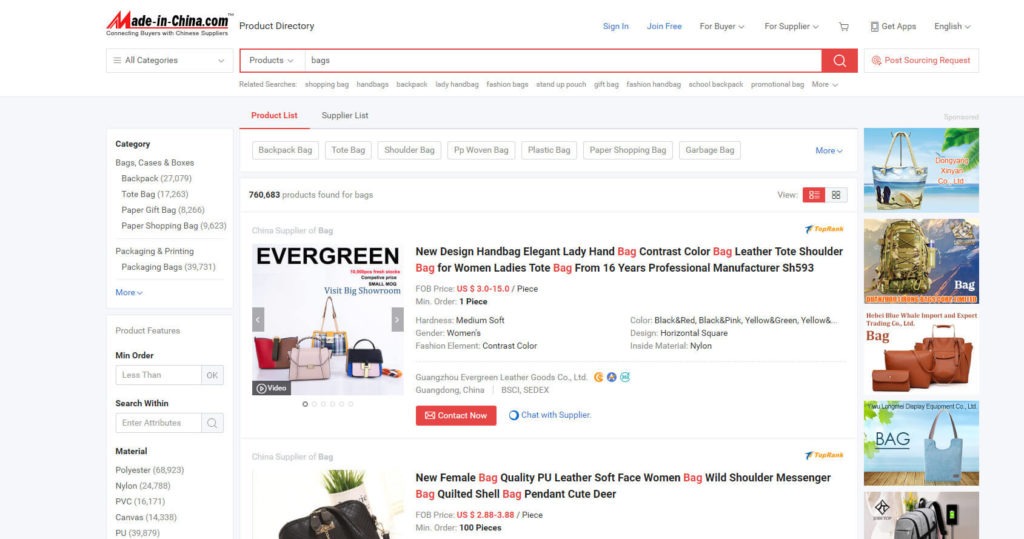
4. AliExpress: is an online retail service based in China and owned by Alibaba. Launched in 2010, it is made up of small businesses in China and other countries, such as Singapore, which offer products to online international buyers. It is the most visited e-commerce site in Russia and the tenth most popular site in Brazil.Facilitates the sale to small businesses by small businesses and allows almost anything to sell. It compares more specifically to eBay because the sellers are independent and use the AliExpress as the host to sell to consumers and other companies. AliExpress offers excellent value for money and competitive prices on more than 100 million products. You can also pay with the world’s most popular and safe payment methods.
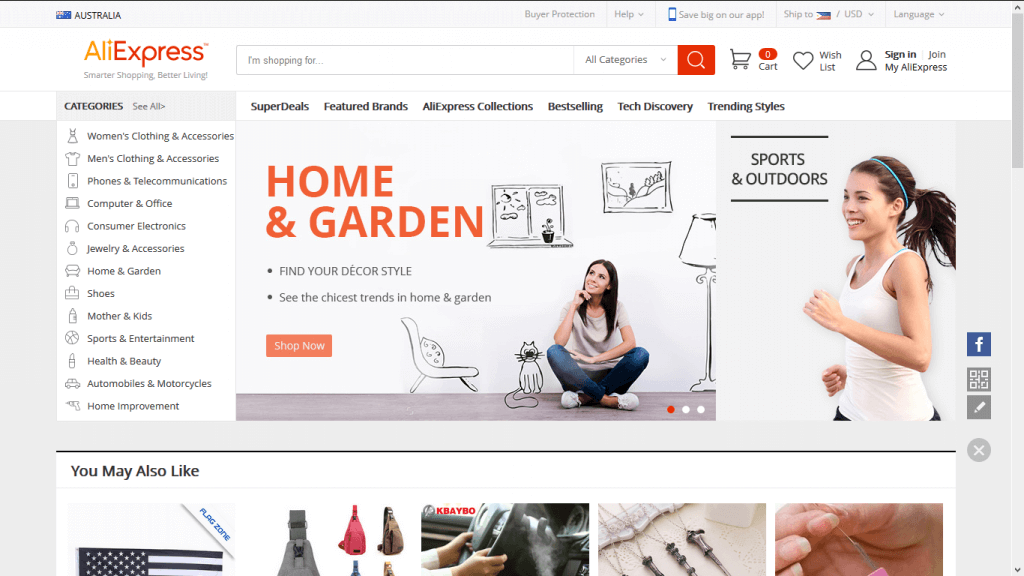
5. Global Sources: established 48 years ago, has built a trusted B2B platform that serves buyers and suppliers online and offline. The company organizes export shopping events in Hong Kong in April and October, with eight events a year, including the world’s largest electronics and mobile trade shows, as well as lifestyle and fashion shows. Global Sources is also the majority shareholder of the Shenzhen International Machinery Industry Exhibition (SIMM) and associated fairs, the major machinery fairs in southern China.
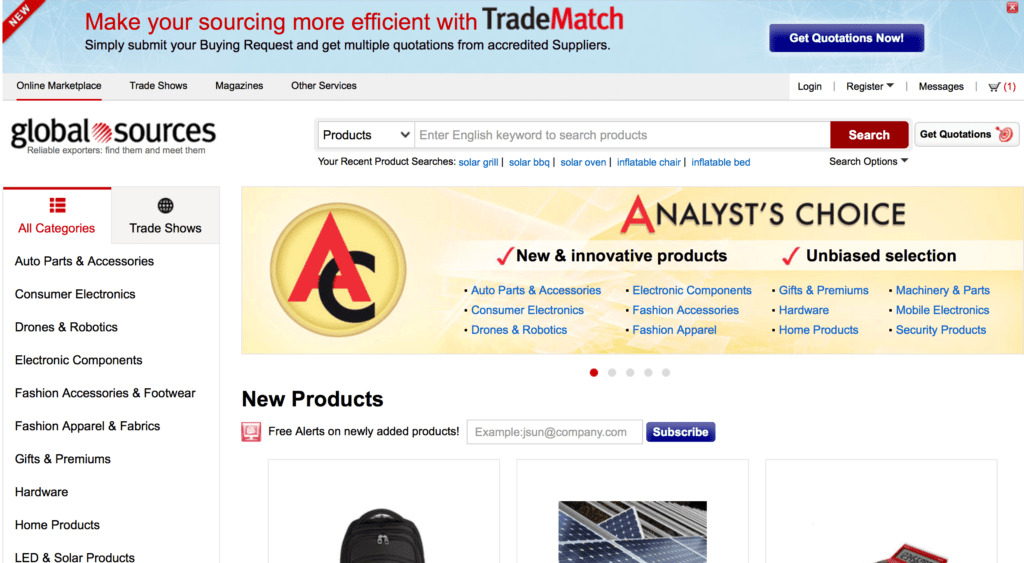
6. The Hong Kong Trade Development Council (HKTDC): is a legal body established in 1966 to promote, assist and develop trade in Hong Kong. With 50 offices around the world, including 13 in mainland China, HKTDC promotes Hong Kong as a global investment and business center. HKTDC organizes international exhibitions, conferences, and trade missions to create business opportunities for companies, especially SMEs, in the continental and international markets.
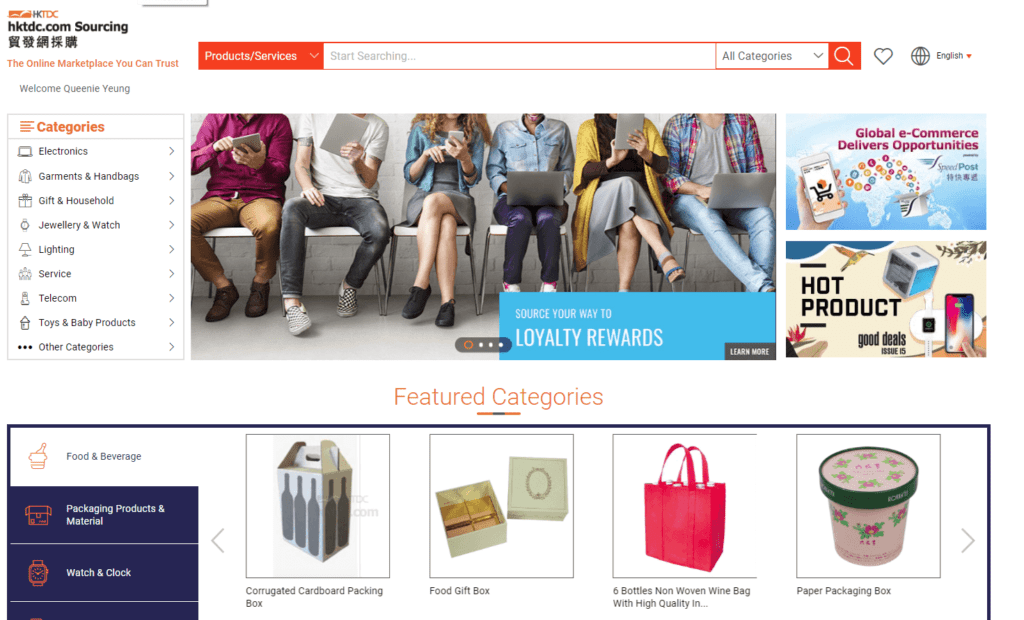
7. CHINA.CN: is developed and operated by Beijing Qizhihaotian Technology Co., Ltd., founded in 2006 with 200 employees in China, based in Beijing. CHINA.CN is a B2B e-commerce platform that connects global buyers and Chinese suppliers. Following the launch of its online trading platform, CHINA.CN has helped many Chinese SMEs to compete in international trade, serving millions of buyers and suppliers worldwide. Thanks to its great authority and influence, CHINA.CN was recognized as a leading team in the B2B market in China.
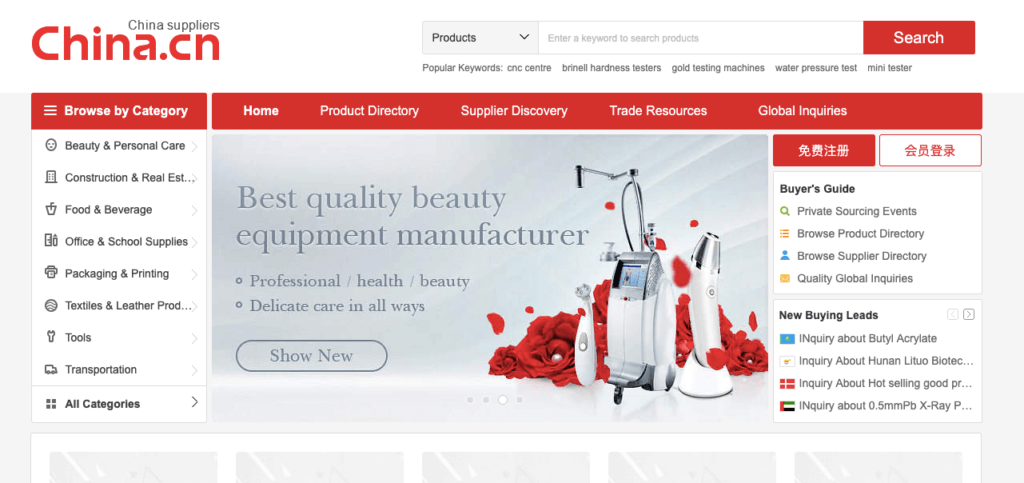
8. LightInTheBox’s: innovative, the data-driven business model enables best spoke products such as wedding dress and evening dress to be scaled to optimal marketing, marketing, and compliance.
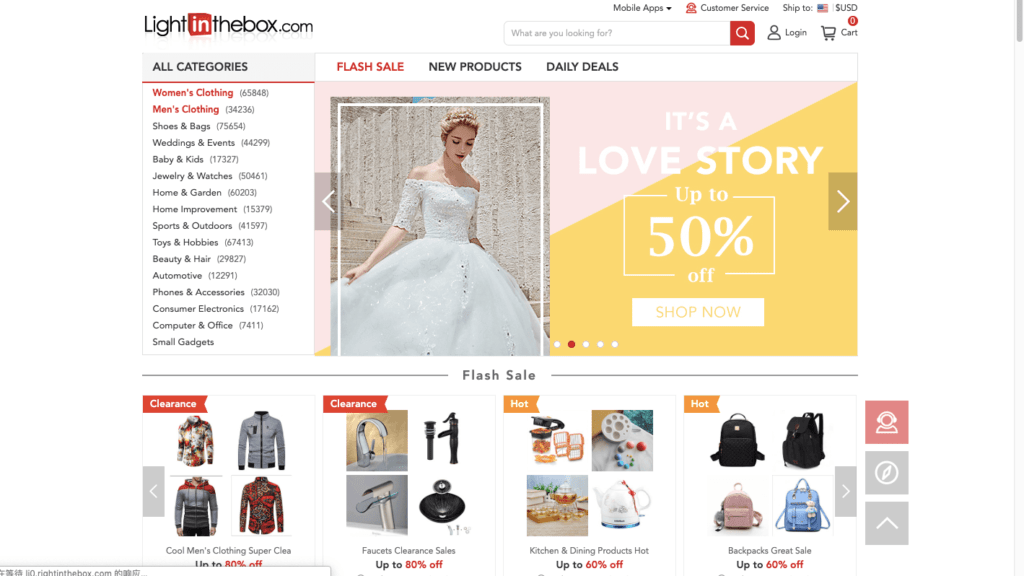
What Benefits Will You Get from A Good Manufacturer?
- Lower manufacturing costs:
The difference in cost between domestic manufacturing and manufacturing in China is significant. Domestic manufacturers have higher overall costs, with high training costs and high turnover. China’s accessibility makes overseas manufacturing ideal for the joint venture. cheaper work:
Outsourcing in China offers access to cheap labor from this factory, without having to train employees, access a computer or face other local hiring difficulties. Wages are significantly lower in China and taking advantage of these savings is as simple as establishing a relationship with a factory.
- Higher production capacity:
Factories in China produce goods for the world economy. They have expanded their manufacturing capabilities beyond what has ever been thought possible. When you outsource China, you work in proven factories that have produced quality products in industries similar to yours for years and in considerable quantities.
- Better opportunities for expansion and diversification:
Do you want to expand your business and offer new product lines or access new markets, but this was not predicted by existing wholesalers? Outsourcing with Chinese manufacturers allows you to do this in real time. You can expand and diversify your product offering as well as sell your products in international markets much more easily.
- Production Efficiency:
Domestic manufacturing can be extremely expensive. Among labor costs and training, manufacturing process complications and equipment costs, American manufacturers and other manufacturing companies located on the continent must have considerable profit margins to be able to manufacture at home. They are industries like the aerospace industry, where profits are considerable and sometimes even backed by the government. New companies and new companies in the industry are unlikely to compete. China eliminates the high failure rate prevailing in the domestic manufacturing industry. Production efficiency is extremely high, and as labor costs are affordable in China, complications such as defects rarely make the operation unfeasible. Things can continue to work well and at low cost to your business.
- Scam Prevention:
One of the biggest concerns about manufacturing in China is the potential for fraud. When you do not work face to face, when there are language barriers, when the plant is located in an ocean, you tend to worry. Companies like Sourcify are actively working to protect companies by connecting them to reliable and internationally controlled plants. You can immediately establish a relationship and start outsourcing your production in China without having to worry about being scammed or exploited. Your system is a surefire way to start which essentially guarantees the success of choosing a factory.
- Communicate and negotiate with the factories:
Traditionally, the language barrier and lack of communication were a disadvantage of working with a foreign provider. Today, this obstacle has been almost completely eliminated. With Skype and other communication technologies, there are many ways to get your message across and communicate with the factory you choose. You can send text emails and chats, chat over VOIP, connect to a conference call, share screens with voice chat, create videos, or use just about any media of your choice. Most factories have representatives who speak English to solve their problems and answer questions. They understand the need for a personalized experience. The opportunity to negotiate with factories is another key advantage of the Chinese manufacturing sector. The competitive nature of factories means they can buy the most accessible and responsive plant to manufacture their products. You have complete freedom to buy, so to speak, and features like Sourcify help you put that power in your hands.
I’m Ada, a professional China sourcing agent in Yiwu, China. I have helped many clients and entrepreneurs around the world find the best business partners and the most sought after products as well as the best opportunities across China. As they say, you earn respect, you appreciate honesty, trust must be gained and then loyalty gets returned.
